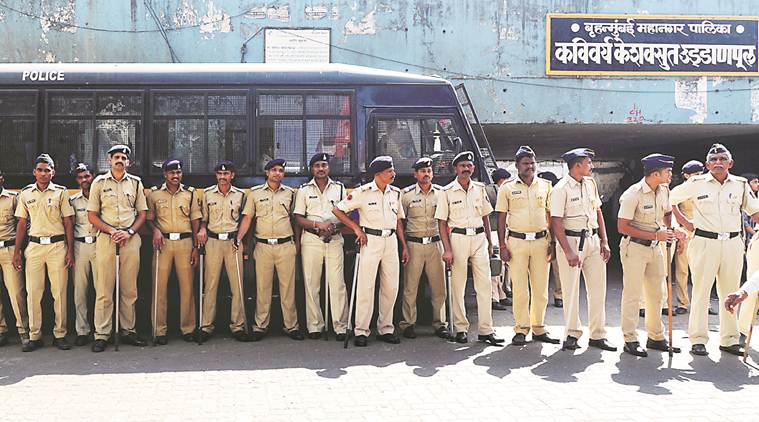A game developed by an NGO has been in the process of carrying out 75 training sessions with the over 90 police stations across Mumbai since September last year to sensitise police about dealing with crimes against women and children.
A GROUP of nearly 25 policemen assemble at the DB Marg police station hall in south Mumbai. They are off duty and over the next seven hours they will play a game, one that will tell them how confident those from the most marginalised groups in society are about going into a police station to make a complaint.
It is a game developed by the Society for Nutrition, Education and Health Action or SNEHA, an NGO that has been in the process of carrying out 75 training sessions with the over 90 police stations across Mumbai since September last year to sensitise police about dealing with crimes against women and children.
This is how the game unfolds: each cop draws a chit from a box, assigning a role — of a transgender, an uneducated woman, a rich urban male. Each is faced with a different crisis, and has to go to the police. The cop takes a step forward every time the person feels confident about approaching the police, and stands still each time the person does not feel confident about going to a police station.
Dr Nayreen Daruwala, programme director at SNEHA, said: “The point of this game or even the sessions we carry out for the cops is to make them realise on their own how the system is skewed against a certain section of the society. Once they reach that point on their own, it will make them more sensitive to particular groups of people like transgenders, who have a difficult time getting a complaint registered.”
At the end of the game, the uneducated woman would not have taken a single step forward, while the rich city slicker would have gone the farthest.
The process of sensitising police about dealing with such crimes began in 2013, when SNEHA spoke to 130 personnel and asked them about what they do when victims in cases of sexual assault, domestic violence and crimes against children approach them. Accordingly, a set of guidelines was formed in consultation with the police. The guidelines were initially actively followed at two police stations — Nehru Nagar in Kurla (east) and Mahim. “After it worked successfully there, we implemented it at five more police stations. It was only in September 2018 that we received the permission to carry out such programmes at all police stations across the city. We have plans to complete 75 sessions and we have finished over 40 already,” said Sachin Kulkarni from SNEHA.
At the training being carried out at the DB Marg police station hall, lawyer Manisha Tulpule addressed a group of around 25 policemen, two each from every police station in the south region. She talked about how victims of sexual violence should be sent to undergo medical tests soon after they approach the police. A woman constable raised her hand and asked, “Sometimes the victims say they don’t want to undergo a medical test or seem hesitant. What do we do in such cases?” Tulpule told her that if the victim doesn’t seem agreeable to the test, they should call for a counsellor who will inform her about how the medical report will help as evidence against the accused. “If even after she knows all the advantages of a medical test, she refuses, then it is an informed refusal, which is fine. She knows the result of her refusal. So the test should either be done with her consent or there should be an informed refusal,” Tulpule said.
Several officers attending the programme said the section where they were taught about the amendments to laws related to sexual violence was of help. “There have been several amendments to the laws and we are given basic training about them. These sessions help clear our doubts,” an officer said.
Police Sub-inspector Yogesh Rane, who attended the sessions, told The Indian Express, “I think the main help most of us got is how to deal with complainants in domestic violence cases. Normally, in such situations, there is a lack of clarity on what is the right course of action. Now, we have been told that when a woman approaches us, we have to make her comfortable and inform the protection officer (PO). We have also been given lists of POs across the city.”
Daruwalla said the Domestic Violence Act was something where a lot more awareness was needed. “More than cases of sexual violence, it is the cases under the DV act where seem to be confusion about the protocol. In several cases, policemen just ask the victim to approach courts. Some policemen can tend to have patriarchal mindset about DV act cases and blame the woman for ‘talking a lot’. In several cases, the policemen say they cannot interfere in something taking place within the house. However, even rapes sometimes take place within four walls. So we try to sensitise them about what is expected from them as per law,” Daruwala said.
Daruwala added that during the programme, which lasts over two days and for nearly seven hours, they try not to talk down to the cops or “lecture them”. “There has to be a mutual respect. It is easy to blame cops for everything. We work with them as partners and just try to make them see things from the complainants perspective. Once they develop that level of empathy, it will reflect in how they interact with such complainants,” she added.
Source: Read Full Article


